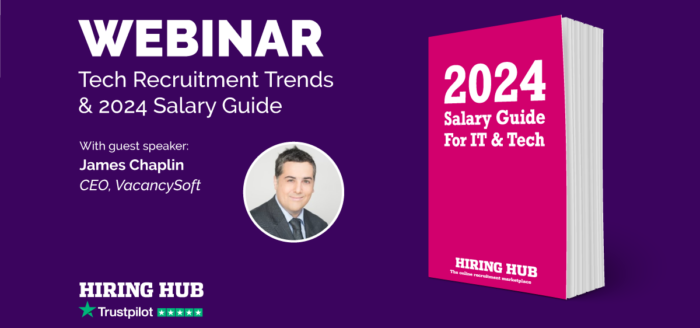
As even the most analogue of companies are fast-shifting into the digital age, the global skills shortage within what is a burgeoning technology sector, becomes ever more pronounced. So how, then, have the top recruiters, and indeed companies, adapted their talent attraction and recruitment strategies to stay ahead of the game, ensuring they snare the top talent when it’s rarer than a puffin riding a southern white rhino?
It’s a question we ask ourselves a lot in the Hiring Hub office (minus the puffin/rhino bit) so, in a bid to understand exactly how the top tech companies are altering their playbook within an industry that’s moving at a million miles a minute, we caught up with Google’s Amy Miller.
A senior tech recruiter at the Seattle office of the online search giant – currently hiring engineers for YouTube – Amy’s at the top of her game, with eight-odd years’ experience; six of those at Microsoft and one at Google. She plays a crucial role in identifying, fluffing, and acquiring the best tech talent in the market, and we wanted to find out how she does it…
Prior to joining Google you were at Microsoft for over five years. In tech terms five years is a lifetime. How have you seen the industry change during this time?
One of the biggest shifts, by far, was that we definitely forced our hiring managers to have more skin in the game. Now I’m not sure if this is a Microsoft shift or an industry shift overall, but I definitely noticed Amazon following this shift too.
Years ago, certainly prior to joining Microsoft, during my non-tech recruitment experience, recruiters really owned the [candidate] outreach and we were very protective of our prospects.
However, I noticed this shift change during my time at Microsoft. We started pushing hiring managers to take ownership of outreach, because they didn’t want to most of the time. But, the reality is, if an IT Director reaches out to a candidate, the candidate is going to be a lot more responsive to the person that could potentially be their boss versus the 17th recruiter sending them the same crappy message that day!
So yeah, that was one of the biggest shifts: how we would approach talent. We really tried to up our game in having the right people reach out to potential candidates. I was, of course, still behind the scenes co-ordinating everything, but there was an emphasis on making our leaders tap into their network, because they can have that deep technical conversation that I couldn’t.
Tell us your secret then… How do you go about finding top tech talent?
This is so interesting because, honestly, there’s no lack of information on people out there. candidates aren’t hard to find, they’re hard to engage.
Candidates aren’t hard to find, they’re hard to engage.
That said, there’s a lot of information … so how do you make sure that you’re able to find ‘top’ tech talent? Well, you have to be very cautious of the balance between the usual markers, whilst still be mindful of diversity. And what I mean by that is that, for example, an individual who has a Computer Science degree and has worked for two large competitors would hit the usual marker as a ‘good quality’ candidate. And, if for example an individual has worked at Amazon, I know that they have experience working within a large-scale systems environment, so I can draw on that experience and apply it to what I’m hiring for at Microsoft.
That’s one way to look at it… So, we can’t discount or ignore education and quality experience, but we’re also mindful that not every great engineer or tech candidate has a degree. So, it’s about looking deeper than that, and looking and their profile as a whole and their previous experience.
However, what we look for most of all is: what were the outcomes of this individuals previous work? A great example of this is one of my favourite hires, when I was recruiting for a Data Scientist for Microsoft five years ago. I was looking for someone with a very technical PHD background. So, typically I’d look for a PHD that went to a top school and played around with lots of data. But, instead I found a young lady who had studied medicine and developed an algorithm to detect heart disease in patients earlier, resulting in longer life expectancy. So, nothing to do with software, but it was the way she applied maths to create life-changing work. So, it was the result of her work that made her a better candidate than someone who had a PHD in a tech background. It was a fascinating fit and ultimately a great hire for us!
How do you go about assessing tech talent?
I rely heavily on my technical experts and tech hiring managers to do the tech screening side of things. I also always ask my hiring managers what key tech skills they want for that specific role.
I then make the calls, nurture the candidates to make sure they’re interested and ready to make the move. I’ll also ask the non-technical questions, so by the time the candidate meets the tech expert, they’ve been screened quite heavily already.
A great way to assess candidates during an interview is to get them talking about their expertise. I’ve been in recruitment for years and years and you can tell if someone knows what they’re talking about. Then when I’ve got them talking, I look to understand two things:
- Can they explain it simple enough that even a non-technical tech recruiter can understand it?
- And do they know what they’re talking about? You can tell when you’ve been a recruiter for a long time – you know when someone’s pulling your leg.
So, I pick up on those queues and relay to the hiring manager if the candidate was confident in what they were talking about, and if they hit those technical markers. If the candidate can’t confidently explain their expertise, then it’s a red flag and 99% of the time they won’t get hired.
Have you got any advice for tech recruiters new in the game?
As long as you have your technical hiring managers to advise what key tech markers to look for, you don’t need to be a technical expert or need to be able to write code to be good at this job.
Do you have any go-to interview questions that you would recommend using when it comes to assessing tech talent?
I do. I always start with, tell me your favourite coding language, what do you currently use and what is your strength? I then ask the candidate to rank them for me in terms of strength and ask them how much time they spend on each language. I also ask them if they’re involved in any code reviews or high-level architecture work.
I then think it’s important to find out exactly how involved in a project the candidate is. Are they checking production codes or doing their own testing? I don’t have to understand how exactly the mechanics work to be able to understand if a candidate’s able to test their own code.
I then think it’s important to find out exactly how involved in a project the candidate is.
I also want to know if a candidate is currently building something. Has the product they’re working on been shipped yet? Where’s it at in the ship cycle? There’s a big difference between a candidate who is building the next version of something cool and keeping an internal 10-year-old legacy alive. Not that one is better than the other, but they are different. And for most of my roles that legacy person wasn’t necessarily a good fit. So, it’s good to figure out what stage of a project a candidate is involved in before getting the technical manager involved.
Have you used psychometric and aptitude tests to assess tech talent? Do you think they’re useful?
For technical folk I have not. I have heard great stuff, but personally I’ve never used them. I would be interested to see it and see what the results are, but I’m dubious as to whether there’s benefit to it.
It should be a more unbiased answer, I know. But, speaking from my own personal experience, when I was being interviewed for one of my first recruiting jobs, I was asked to do one of these tests and it said that I wasn’t motivated by money?! I almost didn’t get the job because of that. My boss-to-be had to ask me why I wasn’t motivated by money and I said, “wait what, I love money ha-ha”.
Yeah, you can sometimes end up missing out on great candidates because the profiling doesn’t say they’ll be the best fit, which may not be the case…
Yes, exactly. I’m nervous about that. If there’s a test to see if a candidate can write code, then I support it. Anything getting into personality and aptitude, I worry a little because people are neurotically so diverse.
Do you think more formal or relaxed interviews work best when it comes to assessing tech talent?
I think we need structure. I think that we need to have a clear way of assessing, which needs to be fair and equal across all of our candidates. However, I do think there needs to be a degree of flexibility, so that we make people feel comfortable.
For example, Microsoft have an autism hiring program, which has a different way of engaging with people that makes it easier for them to show their best self.
I tend to lean towards relaxed when appropriate.
That’s interesting (and brilliant!), so at Microsoft there’s a program tailored to assess autistic candidates?
Yes, it’s great! If you look up “inclusive hiring at Microsoft,” there’s loads of information around it. Reflecting back to the point I made about neurological diversity, individuals who are autistic, or are on the spectrum, sometimes struggle with communication. So, if you put them in a formal interview setting, the way we do with other candidates, they may struggle to communicate as clearly.
So, going back to formal versus informal, I like the formality in the sense that it provides a fair and unbiased way to interview candidates, but I like relaxed in the sense of accommodating and adapting the environment based on how candidates communicate.
The more that an interview can be adapted to accommodate, the better it will be at uncovering if the person can truly do the job.
The more that an interview can be adapted to accommodate, the better it will be at uncovering if the person can truly do the job.
What do you think is the number one lesson others could learn from the likes of Microsoft and Google when it comes to assessing tech talent?
Top tech talent does not always look the same. It doesn’t always have the typical profile of a CS degree, a Masters or interned/worked at a tech giant. Individuals may start their career in something completely different, and then go to night classes or even be a self-taught coder, and they can turn out to be ‘top tech talent’. So that’s the number one lesson – let’s get out of this rigid box that says ‘top tech talent’ have to be a certain pedigree to be good.
Do you tend to hire on experience/skills or attitude?
It has to be skills and potential. It’s a three-legged stool: we have the skills and experience which tells us what the person is capable of. Attitude tells us how they’ll be to work with, and then we have potential, which is the third leg.
Potential is really important, especially when you’re hiring for full-time employment, because we want tech talent to come and stay. We’re not hiring them to just come along, write some code for 18 months and then move on to the next project. We want them to be part of the company. That’s why we pour so much time and money into training tech talent, because we’ve then invested in the company’s success.
So, a candidate can be the best developer in the world, but if they don’t have the right attitude, mindset or potential, it’s not going to work.
In light of the tech skills shortage becoming a bigger and bigger problem, are you finding it tougher to retain quality tech talent?
Oh yes! Now, I’m speaking more from my Microsoft experience because I’ve only been at Google for a couple of months, so it’s too early to tell, but I think in general tech recruiting is tough.
I work in what we affectionately call Cloud City. There’s a big battle in the cloud war, with AWS, Azure and Google – these tech giants are constantly throwing money at developers and engineers. So it starts to become ‘who can write the biggest cheque’.
Retention is a constant challenge. I’m always telling candidates that come from bigger companies that they’re always going to find somewhere else that’s willing to pay them more. But then I challenge them by asking: ‘will they be able to work on project they’re passionate about or at a company that embodies the culture and mission’.
So, sure, there’s a huge challenge in both finding and retaining talent because there’s just so much competition. And a common fallacy is that everyone wants to work for Google. But that isn’t always the case when you have other tech giants such as Facebook and Microsoft competing for the same talent.
Want to discover how the firms like Virgin, Travelex, The Hut Group, Box, and EE determine candidate fit? Get your FREE copy of our ‘Ultimate Guide to Interviews’ here to find out more.
Feature image credit: Google



